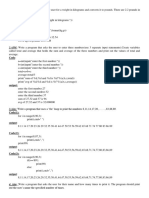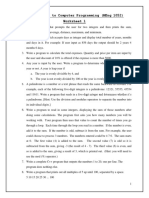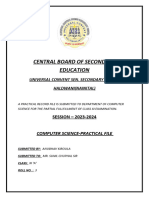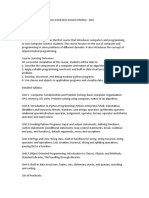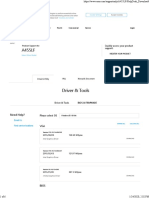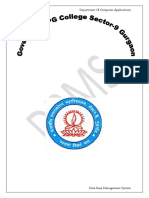0 ratings0% found this document useful (0 votes)
104 viewsR20 EEE-Python Programming Internal Question Paper
This document contains the questions asked in a Python programming internal practical examination for the Electrical and Electronics Engineering branch at B.V.C College of Engineering. The exam contained 18 questions testing a variety of Python programming concepts including lists, files, classes, functions, conditionals, loops, and exceptions. Students were asked to write Python code to solve problems related to data processing, string manipulation, mathematical operations, and more.
Uploaded by
Suryanarayana MurthyCopyright
© © All Rights Reserved
We take content rights seriously. If you suspect this is your content, claim it here.
Available Formats
Download as DOCX, PDF, TXT or read online on Scribd
0 ratings0% found this document useful (0 votes)
104 viewsR20 EEE-Python Programming Internal Question Paper
This document contains the questions asked in a Python programming internal practical examination for the Electrical and Electronics Engineering branch at B.V.C College of Engineering. The exam contained 18 questions testing a variety of Python programming concepts including lists, files, classes, functions, conditionals, loops, and exceptions. Students were asked to write Python code to solve problems related to data processing, string manipulation, mathematical operations, and more.
Uploaded by
Suryanarayana MurthyCopyright
© © All Rights Reserved
We take content rights seriously. If you suspect this is your content, claim it here.
Available Formats
Download as DOCX, PDF, TXT or read online on Scribd
You are on page 1/ 3
B.V.
C COLLEGE OF ENGINEERING:: PALACHARLA-533104
DEPARTMENT OF COMPUTER SCIENCE AND ENGINEERING
Name of the Examination: II B.Tech-II Sem Reg (R20) Internal Practical Examination June-
2022
Name of the Laboratory : Python Programming
Date of Examination : 24-06-2022
Name of the Branch : ELECTRICAL AND ELECTRONICS ENGINEERING
Question paper
1. A) Write a program that removes any repeated items from a list so that each item appears
at most once. For instance, the list [1,1,2,3,4,3,0,0] would become[1,2,3,4,0].
B) Write a program that asks the user to enter three numbers (use three separate input
statements). Create variables called total and average that hold the sum and average of the
three numbers and print out the values of total and average.
2. A) Write a program that asks the user for two numbers and prints Close if the numbers are
within .001 of each other and Not close otherwise.
B) Write a program that reads a list of temperatures from a file called temps.txt, converts
those temperatures to Fahrenheit, and writes the results to a file called ftemps.txt.
3. A) Write a program that generates 100 random integers that are either 0 or 1. Then find the
longest run of zeros, the largest number of zeros in a row. For instance, the longest run of
zeros in [1,0,1,1,0,0,0,0,1,0,0] is4.
B) Generate a random number between 1 and 10. Ask the user to guess the number and print
a message based on whether they get it right or not.
4. A) Write a class called Converter. The user will pass a length and a unit when declaring an
object from the class for example, c = Converter (9,'inches'). The possible units are inches,
feet, yards, miles, kilometers, meters, centimeters, and millimeters. For each of these units
there should be a method that returns the length converted into those units. For example,
using the Converter object created above, the user could call c. feet () and should get 0.75 as
the result.
B) Write a program that asks the user for a weight in kilograms and converts it to pounds.
There are 2.2 pounds in a kilogram.
5. A) Write a program that opens a file dialog that allows you to select a text file. The
program then displays the contents of the file in a textbox.
B) Write a function called number_of_factors that takes an integer and returns how many
factors the number has.
6. A) Write a function called is sorted that is given a list and returns True if the list is sorted
and False otherwise.
B) Write a program that asks the user for a word and finds all the smaller words that can be
made from the letters of that word. The number of occurrences of a letter in a smaller word
can’t exceed the number of occurrences of the letter in the user’s word.
7. A) Write a class called Product. The class should have fields called name, amount, and
holding the product’s name, the number of items of that product in stock, and the regular
price of the product. There should be a method get_price that receives the number of items to
be bought and returns a the cost of buying that many items, where the regular price is charged
for orders of less than 10 items, a 10% discount is applied for orders of between 10 and 99
items, and a 20% discount is applied for orders of 100 or more items. There should also be a
method called make_purchase that receives the number of items to be bought and decreases
amount by that much.
B) Write a Python class to reverse a string word by word.
8.A)Write a program that asks the user for a large integer and inserts commas into it
according to the standard American convention for commas in large numbers. For instance, if
the user enters 1000000, the output should be1,000,000.
B) Write a function called first_diff that is given two strings and returns the first location in
which the strings differ. If the strings are identical, it should return-1.
9. A) Write a function called root that is given a number x and an integer n and returns x1/n.
In the function definition, set the default value of n to2.
B) Write a function called primes that is given a number n and returns a list of the first n
primes. Let the default value of n be100.
10. A) Write a program that uses a for loop to print the numbers 8, 11, 14, 17, 20, . . . , 83,
86,89.
B) Write a program that asks the user for their name and how many times to print it.The
program should print out the user’s name the specified number of times.
11. A) Write a class called Time whose only field is a time in seconds. It should have a
method called convert_to_minutes that returns a string of minutes and seconds formatted as
in the following example: if seconds is 230, the method should return '5:50'. It should also
have a method called convert_to_hours that returns a string of hours, minutes, and seconds
formatted analogously to the previous method.
B) Write a Python class to implement pow(x,n).
12. A) Write a program that asks the user to enter two strings of the same length. The
program should then check to see if the strings are of the same length. If they are not, the
program should print an appropriate message and exit. If they are of the same length, the
program should alternate the characters of the two strings. Forexample, if the user enters
abcde and ABCDE the program should print outAaBbCcDdEe.
B) Write a program to overload operator
13. A) Write a program that asks the user to enter a length in feet. The program should then
give the user the option to convert from feet into inches, yards, miles, millimeters,
centimeters, meters, or kilometers. Say if the user enters a 1, then the program converts to
inches, if they enter a 2, then the program converts to yards, etc. While this can be done with
if statements, itis much shorter with lists and it is also easier to add new conversions if you
use lists.
B) Write a program to demonstrate try/finally and with/as.
14. A) Write a program that generates a list of 20 random numbers between 1 and100.
(a) Print the list.
(b) Print the average of the elements in the list.
(c) Print the largest and smallest values in the list.
(d) Print the second largest and second smallest entries in the list
(e) Print how many even numbers are in the list.
B) Write a program for inheritance in python
15. A) Write a program that asks the user to enter a word and prints out whether that word
contains any vowels.
B) Write a function called sum_digits that is given an integer num and returns the sum of the
digits of num.
16. A) In algebraic expressions, the symbol for multiplication is often left out, as in 3x+4y or
3(x+5). Computers prefer those expressions to include the multiplication symbol, like
3*x+4*y or 3*(x+5). Write a program that asks the user for an algebraic expression and then
inserts multiplication symbols where appropriate.
B) Write a program that reads a file consisting of email addresses, each on its own line. Your
program should print out a string consisting of those email addresses separated by
semicolons.
17. A) Write a program that asks the user for an integer and creates a list that consists of the
factors of that integer.
B) Use a for loop to print a triangle like the one below. Allow the user to specify how high
the triangle should be.
18. A) Write a function called merge that takes two already sorted lists of possibly different
lengths, and merges them into a single sorted list.
(a) Do this using the sort method. (b) Do this without using the sort method.
B) Write a program to demonstrate Try/except/else.
*
**
***
****
Signature of the Internal Examiner
You might also like
- Python Programming: Guru Nanak Dev Engg CollegeNo ratings yetPython Programming: Guru Nanak Dev Engg College54 pages
- mastering data with python and postgrsqlNo ratings yetmastering data with python and postgrsql38 pages
- COMPUTER SCIENCE GRADE-11 QUESTION BANKNo ratings yetCOMPUTER SCIENCE GRADE-11 QUESTION BANK38 pages
- DAC / Wimc Stage - II Sample Question: Page 1 of 3No ratings yetDAC / Wimc Stage - II Sample Question: Page 1 of 34 pages
- II-B.Tech-ECE-Python Programming-SyllabusNo ratings yetII-B.Tech-ECE-Python Programming-Syllabus4 pages
- For Dac / Wimc Course Sample C Questions For Cet Stage - Ii: Page 1 of 1No ratings yetFor Dac / Wimc Course Sample C Questions For Cet Stage - Ii: Page 1 of 15 pages
- Class XI CS Practical File 2024-25 Compressed[1]No ratings yetClass XI CS Practical File 2024-25 Compressed[1]24 pages
- EXERCICES ON Python PROGRAMMING LANGUAGENo ratings yetEXERCICES ON Python PROGRAMMING LANGUAGE2 pages
- Enter Your Name Nishigandha Enter Your Age 22 Nishigandha You Will Turn 100 Years Old in 2098100% (1)Enter Your Name Nishigandha Enter Your Age 22 Nishigandha You Will Turn 100 Years Old in 209814 pages
- COMPUTER SCIENCE PRACTICAL FILE - Arnav-1-1 (1) 1No ratings yetCOMPUTER SCIENCE PRACTICAL FILE - Arnav-1-1 (1) 1102 pages
- AP Computer Science Principles: Student-Crafted Practice Tests For ExcellenceFrom EverandAP Computer Science Principles: Student-Crafted Practice Tests For ExcellenceNo ratings yet
- Open Street Map - Lite - Open Layers - From Map To Web PresentationNo ratings yetOpen Street Map - Lite - Open Layers - From Map To Web Presentation39 pages
- E-Content Available in VTU Elearning Website (E-Notes and Lecture Videos) SL No Sub. Code Course NameNo ratings yetE-Content Available in VTU Elearning Website (E-Notes and Lecture Videos) SL No Sub. Code Course Name6 pages
- Riphah International University Faculty of Computing Programming Fundamentals Lab 3: Taking Input From UsersNo ratings yetRiphah International University Faculty of Computing Programming Fundamentals Lab 3: Taking Input From Users2 pages
- Linear Filtering Using Overlap Add and Overlap Save Method: Date: 03/04/2023 Expt No.: 03No ratings yetLinear Filtering Using Overlap Add and Overlap Save Method: Date: 03/04/2023 Expt No.: 037 pages
- Demystifying The Number of Vcpus For Optimal Workload PerformanceNo ratings yetDemystifying The Number of Vcpus For Optimal Workload Performance12 pages
- Lab Answer Key: Module 2: Office 365 Administration, Tools, and Techniques Lab: Administering Office 365No ratings yetLab Answer Key: Module 2: Office 365 Administration, Tools, and Techniques Lab: Administering Office 36511 pages
- AdaptiveMobile Security Simjacker Briefing PaperNo ratings yetAdaptiveMobile Security Simjacker Briefing Paper2 pages
- Information and Communication Technology Test PaperNo ratings yetInformation and Communication Technology Test Paper1 page
- Uganda Standards Catalogue As of 30 June 2023-FinalNo ratings yetUganda Standards Catalogue As of 30 June 2023-Final1,010 pages
- Solutions For Problems: Principles of Cyber-Physical Systems by Rajeev AlurNo ratings yetSolutions For Problems: Principles of Cyber-Physical Systems by Rajeev Alur6 pages




























